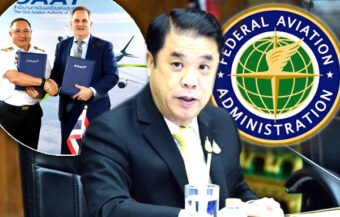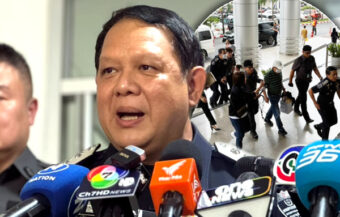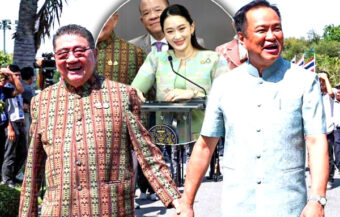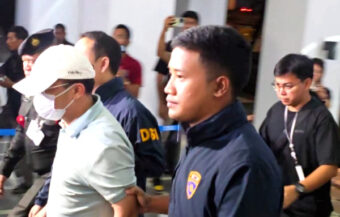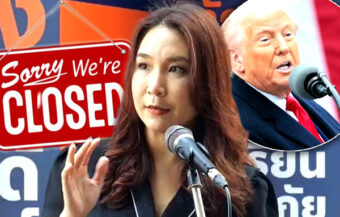People’s Party deputy leader warns Thailand risks ‘Middle Income Trap’ without bold reforms. Wira Yut Kanchanachuchat urges dismantling privilege, fostering competition and empowering players to drive economic growth through openness and innovation.
A Deputy Leader of the People’s Party has underlined the need for Thailand to become a more competitive, free, and open society in order to overcome the daunting challenge of the “Middle Income Trap” it faces. Wira Yut Kanchanachuchat cites a World Bank report as he warns that Thailand must become “lean and clean” with fewer barriers to competition. The former academic argues that money and investment alone will fail to transform Thailand or prepare it to become a tiger economy driven by innovation and technology.

As Thailand enters 2025, a respected academic, thinker, and leading light of the People’s Party warns that the Thai economy must prepare to face the dreaded Middle Income Trap.
Mr. Wira Yut Kanchanachuchat, in particular, has cited a 2024 World Bank report on innovation as a key insight for Thai policymakers. In short, he argues that Thailand’s privileged and patriarchal system impedes real and substantial innovation.
In turn, that innovation is the key ingredient for the country’s economy to take off. Previously, Mr. Wira has highlighted the country’s vast array of structural problems. In short, he refers to them as holes in the Thai economy.
Tackling systemic flaws is key to addressing privilege and creating innovation in the Thai economy
According to Mr. Wira, who is a deputy leader of the People’s Party, the country’s largest, these are holes in the economy.
They include a dysfunctional education system, corruption, and most particularly economic monopolies. In turn, these are reinforced by family connections and privileged dynasties in Thailand’s corporate workplace.
Finally, Mr. Wira suggests that no matter how much money is pumped into the Thai economy, it will be lost unless these issues are addressed. To plug the holes, Thailand must tackle its chronic inequality and privilege.
Certainly, that means boosting its education system and prioritizing the acquisition of new knowledge. However, most importantly, it means giving newcomers and new entrants a kickstart to take on dominant economic players.
Mr. Wira holds a master’s degree in Political Economy from Chulalongkorn University and a doctorate in Economics from the University of Cambridge, England. He believes that Thailand can once again become the fifth international tiger economy. The former academic, now turned politician, was educated at Chulalongkorn University and later at the University of Cambridge in the United Kingdom.
Thailand must embrace change to tackle inequality and adapt to global challenges in 2025 and beyond
Certainly, he is warning that Thailand faces a challenge in dealing with the incoming Trump administration. At the same time, the impact of dumping from China on Thailand’s manufacturing base is only beginning to be felt.
What Mr. Wira recommends is plugging the holes in the economy. He calls for making Thailand “lean and clean” and opening up the country to competition and innovation, certainly more so than now.
In recent days, he has referred to the latest World Bank report for 2024. He claims it’s clear that Thailand’s way out of the Middle Income Trap cannot simply be about economics and finances.
Mr. Wira says what is required is a new philosophy in adapting to technology. Nothing less than a change in society and politics. He claims Thailand is being held back because talented people are being excluded.
Open and free societies are vital for innovation and breaking free from the middle-income trap in Thailand
Undoubtedly, a country cannot prosper beyond middle-income levels without creativity and innovation. At the same time, that can only take place in a society with complete political freedom.
Wira takes issue with the notion that economics is an issue quite apart from politics and society. In brief, he claims that the reality in the world is that added value and real innovation only thrive in open and free societies.
Certainly, his view challenges conventional orthodoxy up to 2017 when China was seen as an emerging economic force.
In summary, Mr. Wira claims that money being injected into the economy is not enough to transform a middle-income developing economy.
In truth, he is talking about the country’s zeitgeist, confidence, and the individual character of the people participating in the economy.
Nepotism and privilege hinder talent and stifle innovation in Thailand’s pursuit of real and substantial economic transformation
Certainly, in Thailand, a large proportion of the population is limited. This is not just about a lack of resources. Significantly more important is opportunity. For instance, many choice jobs are filled through nepotism or family connections.
Therefore, the reality is that the most talented and inspired people may not make it to the top. Or more specifically, to positions where they can, in turn, generate new ideas and initiatives. Furthermore, these inspiring and talented people may not have the opportunity to mentor others.
Wira underlines that the World Bank mentions the word “incumbents” no less than 220 times in its 241-page report. Of course, this means the market leader, the dominant force, or the key holder of power. Certainly, it should be remembered that this over-reliance on incumbents stifles economic growth and dynamic development.
After that, Wira refers to the “Schumpeter theory.” In short, the need for creative destruction throughout the economy. New ideas, new players, stiffer, and more threatening competition.
Eliminating monopolies and fostering competition can drive innovation and robust growth in Thailand
Undoubtedly, this is what is required to drive innovation and achieve robust growth. The People’s Party leader, who loves Japanese Manga culture and works closely with parliamentary firebrand Sirikanya Tansakul, in brief, is arguing for the elimination of monopolies in Thailand.
Especially state enterprise monopolies and those controlled by powerful families.
In his attack on the present situation, he gives the example of Kodak, which found itself redundant in the digital camera era. At the same time, he argues that competition may drive Thailand’s larger firms and conglomerates to achieve greater excellence and innovation.
Undeniably, this could be even more beneficial as they have economies of scale. However, he cautions that they are far more likely to devote their resources instead to political influence-peddling.
Political corruption and reliance on incumbents threaten Thailand’s innovation and economic progress
Here, he cites economic malaise in Italy, a formerly strong European economy that has been blighted by economic stagnation driven by political corruption.
At length, the World Bank highlights this. It suggests that middle-income countries with elites tend to shy away from the “technology frontier.” In turn, Thailand’s best-standing students, as they enter the workforce, are thought to limit their thinking. Basically, innovation and ideas that have never been thought of before are not entertained.
Afterwards, these talented young people either adapt to Thailand’s ethos or leave the country, creating a “brain drain” that is costly to the country dearly.
Wira therefore insists that Thailand needs new competition authorities with real teeth. At the same time, all sectors must be opened up to competition. In addition, the actions of large players must be scrutinized and, where necessary, blocked.
Presently, the current climate is not healthy. In turn, this certainly impacts foreign direct investment. Foreign players have to deal with over-regulation and “incumbents” with political connections.
Building a merit-based society is key to fostering knowledge, innovation, and long-term economic growth
Furthermore, corruption itself becomes a black hand tool to be used by those in control who seek to drive away innovation and change.
Wira calls for Thailand to become a merit-based society where knowledge and skills count for everything. Presently, this is not the case. He cites the 3Ns, which emanate from Thailand’s economy. These are Networks, Neighborhoods, and Norms. The latter being the status quo and scepticism of change.
Channel 3 TV firm announces radical restructuring as ad revenue moves inexorably online and off-air
Commerce Ministry bullish about exports under Trump but ‘America First’ surely spells challenges for Thailand
In contrast, what is required is a level playing field. An environment where new ideas and services can flourish. Later, these services and products may be exported, while new technology is patented. This is Wira’s vision.
Join the Thai News forum, follow Thai Examiner on Facebook here
Receive all our stories as they come out on Telegram here
Follow Thai Examiner here
Further reading:
Ung Ing congratulates Trump as Thailand uneasily confronts the meaning of his second Presidency
Paetongtarn’s government set to tackle the evil of chronic debt in Thailand as the tide still rises
Srettha’s crisis is not just an economic one, it is a ‘3D debt crisis’ that is strangling GDP growth
Zombie Thai firms holding back economic growth as they struggle just to pay interest on bank debt
Incoherent government economic policy clashes with Bank of Thailand’s efforts to rein in debt
Economy is in troubled waters with fears for both exports and foreign tourism as 2023 winds down
Thailand faces an economic future of low growth despite Srettha’s plans because of a darker world
Another dip for the baht or are economic danger signals flashing for both Thailand and the world?
Police chief confirms 2 dead with reports of at least one more fatality in Bangkok mass shooting

